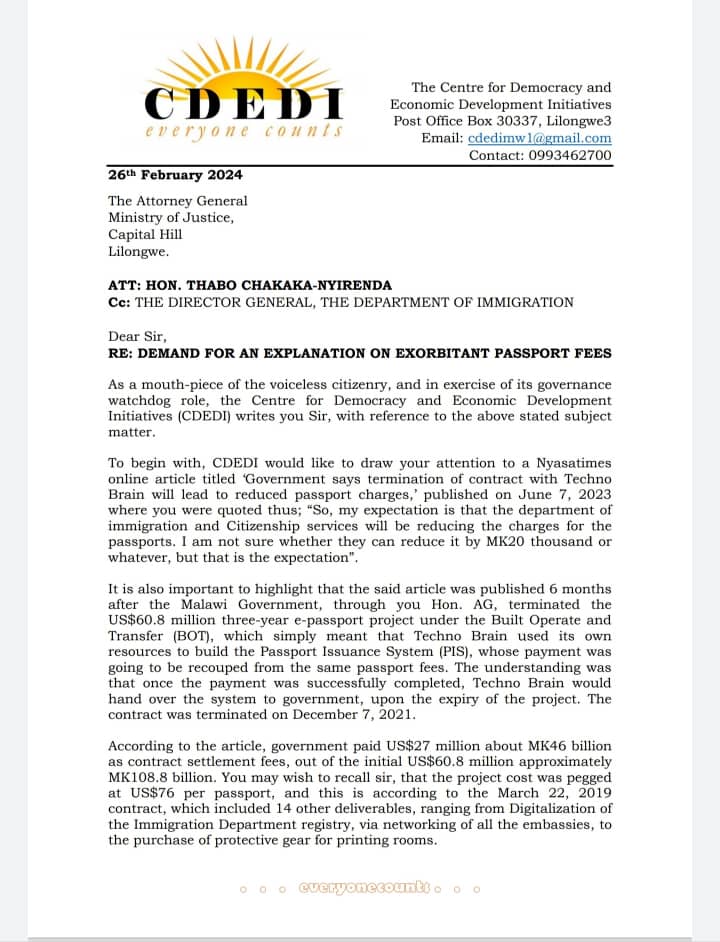By IOMMIE CHIWALO

The Centre for Democracy and Economic Development Initiatives (CDEDI) has warned the Tonse Alliance administration against continuation of the current passport crisis at the Department of Immigration and Citizen Services.
In a press release made available to this publication, CDEDI Executive Director Sylvester Namiwa says the standstill at Immigration Department tantamount to criminal
negligence as some Malawians have been greatly inconvenienced including lost of their loved ones who were expecting to receive medical treatment outside Malawi.
Namiwa says is sad that majority have failed to carry out important businesses, and even lost life-time job and study opportunities because they could not obtain a passport.
He has since warned that necessary action will be taken against the Office of the Attorney General Thabo Chakaka Nyirenda which terminated contract of service provider at the Immigration Department – Techno Brain.
Namiwa says AG’s failure to do the needful by Friday March 1, 2024 will prompt CDEDI to commence nationwide demonstrations.
Today is exactly a month since the Department of Immigration and Citizenship Services announced the ‘extensive maintenance works’ when, in fact, the
Passport Issuance System (PIS) had shutdown way back.
Apart from the aforementioned notice, there has been no update on the matter, save for President Lazarus Chakwera, while answering questions in Parliament on February 21, 2024, told the world that the PIS had been hacked, and the hackers were demanding a ransom.
However, according to investigation by CDEDI, the system was not hacked but rather the PIS shut down in the process of being tampered with by some Malawi Congress Party (MCP) self acclaimed IT experts.
Meanwhile, CDEDI is urging all well-meaning Malawians to demand prompt action for the resumption of passport printing service.
“Furthermore, Malawians should demand an immediate reduction of passport fees, following the termination of the March 22, 2019 Government and Techno Brain Build, Operate and Transfer (BOT) three-year e-Passport project,” says Namiwa giving a brief highlight that all pointers are clear that Malawians are being milked looking the online survey results which shows that passport books are fetching around $2.01 in Singapore and $4.19 in Hungary, which translates to K3,000 and K7,000 per booklet, respectively, meaning that the K14,000 per passport cost was feasible.
Namiwa has also disclosed that his organisation has written Attorney General Thabo Chakaka-Nyirenda, demanding justification for the exorbitant passport fees, almost three years after the termination of the $60.8 million (about K108.8 billion) contract on December 7, 2021, an exercise that was undertaken to reduce the cost of acquiring the passport.
He says the demands are justified because Malawians are still paying through the nose to access the passport, which is in sharp contrast to the basis of contract termination and President Chakwera’s own campaign promise that passport fees would be K14,000.
“Since Malawians are still paying passport fees at the project price of K93,000, through the same dedicated bank account meant for the Techno Brain payment, and not directly to Treasury, CDEDI intends to benefit from the
Access To Information (ATI) Act by demanding disclosure of money saved following the termination of the contract and as to when exactly will government reduce the passport price to K14,000,” says Namiwa.
He further demanded that Attorney General should sanction a forensic audit of the dedicated bank account since as it stands, passport fees are not paid directly to Treasury.
It is also withing the demands that the office of the Attorney General should explain how GIT was identified as maintenance consultant, including terms of reference for the same.
Initially government paid $27 million (about K46 billion) as contract settlement fees, for the project whose cost was pegged at $76 (about K90,000 then) per passport, including 14 other deliverables, ranging from digitalisation of the Immigration Department registry, via networking of all the embassies, to the purchase of protective gear for printing rooms.



